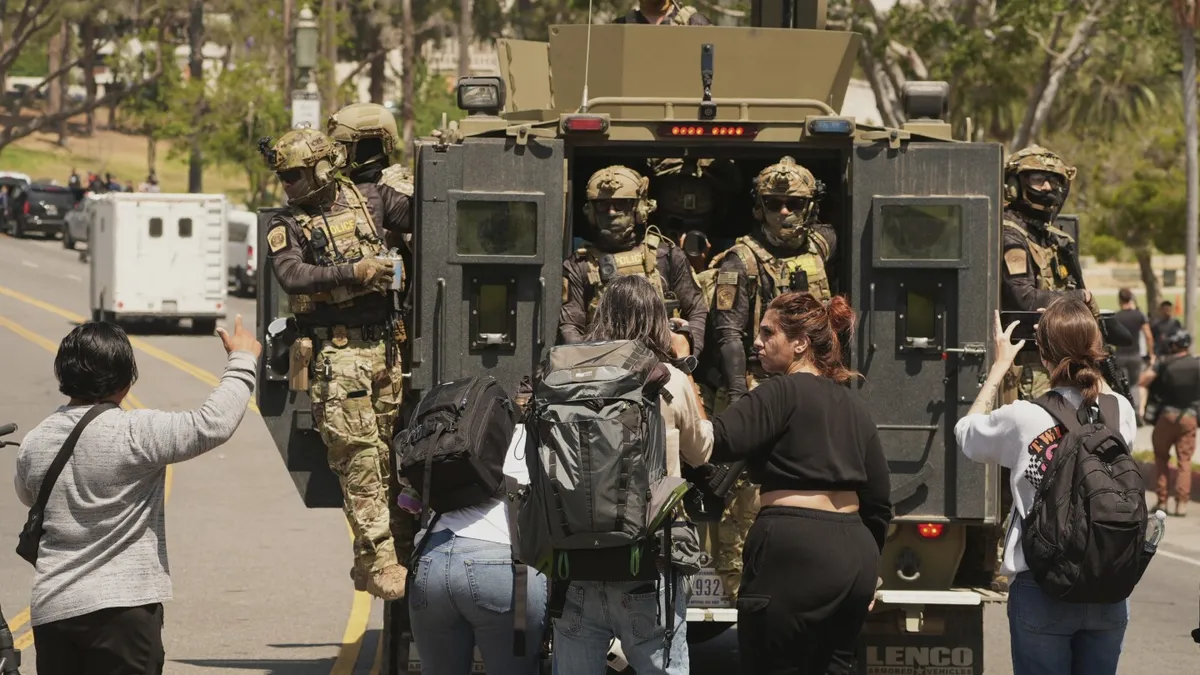
In a highly publicized operation, dozens of federal officers dressed in tactical gear, along with approximately 90 members of the California National Guard, were deployed for about an hour on Monday to MacArthur Park, a Los Angeles neighborhood known for its large immigrant population. The operation raised questions and concerns, particularly regarding the treatment of local residents and the overall intent behind such a show of force.
Los Angeles Mayor Karen Bass described the scene in the park as resembling “a city under siege, under armed occupation,” emphasizing the unsettling atmosphere for families and children present in the area. She criticized the deployment as a "political stunt," noting that children attending a nearby day camp were quickly ushered indoors to shield them from the sight of armed troops. Bass recounted a conversation with an 8-year-old boy who expressed his fear of ICE (Immigration and Customs Enforcement), highlighting the emotional toll such operations can have on vulnerable populations.
MacArthur Park is often referred to as the “Ellis Island of the West Coast” due to its vibrant community comprised primarily of Mexican, Central American, and other immigrant groups. The park features a murky lake surrounded by palm trees, an amphitheater for summer concerts, and sports fields where immigrant families gather to play soccer. The area is well-known for its bustling atmosphere filled with unlicensed food stands offering tacos and other delicacies, alongside vendors selling various goods. Mayor Bass criticized the military presence, asking, “What are they searching for? In an area where children play?”
The operation at MacArthur Park included substantial military resources, such as 17 Humvees, four tactical vehicles, and two ambulances, along with armed soldiers. This intervention is part of President Donald Trump’s broader immigration policy, which has seen a significant increase in military involvement in immigration enforcement. Following protests over previous raids, Trump dispatched thousands of National Guard members and active-duty Marines to Los Angeles, escalating his agenda to deport millions of undocumented immigrants.
California Governor Gavin Newsom voiced his disapproval of the military presence, labeling the events at MacArthur Park as “a spectacle.” He claimed that the administration's actions are not focused on apprehending dangerous criminals but rather on undermining the fabric of the state. Local officials, including Council Member Eunisses Hernandez, argued that the operation targeted communities based on their demographics and the cultural significance of the park.
In response to inquiries about the operation, the Department of Homeland Security stated it would not comment on "ongoing enforcement operations." However, defense officials clarified that the deployment was not a military operation, although its scale and visibility could lead the public to perceive it as such. They emphasized that the primary role of the troops was to provide security for immigration enforcement officers and to protect them in case of a hostile crowd.
The presence of federal officers and military personnel in MacArthur Park has heightened fears among local residents. Marqueece Harris-Dawson, president of the Los Angeles City Council, likened the operation to “staging for a TikTok video,” criticizing the use of force as a means of intimidation. Legal advocates like Chris Newman described the event as a “demonstration of escalation,” pointing out that fewer people visit the park and surrounding immigrant neighborhoods due to ongoing fears of enforcement actions.
Residents like Betsy Bolte, witnessing the military-style helicopter circling above, expressed feelings of terror at the display of federal might in their community. “It’s ripping the heart and soul out of Los Angeles,” she lamented, reflecting the emotional distress created by such operations. This sentiment resonates with many who feel that the heavy-handed tactics of federal agents contribute to a growing sense of fear and uncertainty in immigrant communities.
As the situation unfolds, local leaders and advocates continue to call for a reevaluation of these tactics, emphasizing the need for a more compassionate approach to immigration enforcement that prioritizes the safety and well-being of families and children.